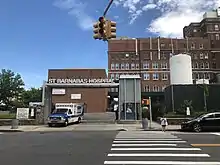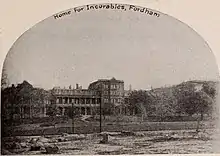St. Barnabas Hospital (Bronx)
St Barnabas Hospital is a non-profit hospital founded in 1866. The hospital is located in the Belmont neighborhood of The Bronx in New York City. The hospital is a level 2 adult trauma center.[1][2][3]
| St. Barnabas Hospital | |
|---|---|
| St Barnabas Health System | |
 | |

| |
| Geography | |
| Location | 4422 Third Ave, The Bronx, New York, United States |
| Coordinates | 40.852110°N 73.891456°W |
| Organization | |
| Care system | Private |
| Funding | Non-profit hospital |
| Type | Teaching |
| Affiliated university | CUNY School of Medicine, New York Institute of Technology College of Osteopathic Medicine |
| Services | |
| Emergency department | Level II trauma center |
| Beds | 422 |
| Speciality | Teaching |
| Public transit access | |
| History | |
| Former name(s) |
|
| Opened | 1866 |
| Links | |
| Website | sbhny |
| Lists | Hospitals in New York |
| Other links | Hospitals in The Bronx |
History
St Barnabas Hospital, originally known as the Home for the Incurables, was founded in 1866 by Reverend Washington Rodman, of the Grace Episcopal Church in West Farms, Bronx. The hospital became the first chronic disease hospital and was housed in a modest frame house and could serve 33 patients.[4][5] The hospital moved to its present location on Third Avenue in 1874 where by 1911 it could accommodate 300 beds. Support for the non-profit hospital came from New York Society including Cornelius Vanderbilt (who served on the hospital's Board of Managers), John Jacob Astor, Theodore Roosevelt and Frederick Law Olmsted.[6] Between 1926 and 1931, the hospital added three new buildings to the hospital and in 1947, the hospital changed its name to St Barnabas Hospital.[5][7] In 1969, St Barnabas broke ground for a six-story West Wing with 188 beds, a cafeteria and kitchen. St Barnabas Nursing Home was founded in 1972, and is located on the hospital's campus at 2175 Quarry Rd.[8]
In 1983, Dr. Ronald Gade was promoted to the hospital's president from head of radiology and worked to make the hospital more efficient in its care of patients. He reduced the staff size, discouraged long hospital stays, and greatly increased income from Medicaid due to improvements. His implementations at St Barnabas challenged the medical establishment by creating a managed-care revolution in American medicine. By the late 1990s, the hospital won two city contracts worth almost $450 million, one to provide doctors for Lincoln Hospital in the South Bronx, the other to care for prisoners on Rikers Island. In the 1990s, the hospital received state designation as a Level 2 Trauma Center and created an AIDS Center and Stroke Center.[5][9]
The hospital is a major clinical teaching site for the New York College of Osteopathic Medicine.[10] In 2016, the hospital also became an affiliate of CUNY School of Medicine to recruit underrepresented minorities into medicine, increase medical care in underserved communities, and boost the number of primary care physicians.[11][12][13]

Notable personnel
- Dr. Irving S. Cooper – developed cryothalamectomy as a surgical technique for primary control of tremor in patients with Parkinson's disease during his employment (1954–1977)[14]
- Dr. Humayun Chaudhry - Completed residency at St. Barnabas. Became Commissioner of Health Services for Suffolk County, New York. He later became CEO of the Federation of State Medical Boards.
- Dr. Richard F. Daines – Served as Senior Vice President for Professional Affairs and Medical Director. After leaving St. Barnabas Hospital, he became the president of St. Luke's-Roosevelt Hospital Center (now Mount Sinai Morningside) in Manhattan. Still later, he became the New York State Health Commissioner
Deaths of notable people
- Bryant Baker (1881–1970) sculptor[15]
- Emanuel Balaban (1895–1973) pianist[16]
- Reginald Bathurst Birch (1856–1943) illustrator[17]
- Benjamin Feigenbaum (1860 – 1932) Yiddish socialist, newspaper editor, translator, and satirist.[18][19]
- Lesandro “Junior” Guzman-Feliz (2002-2018) victim of gang violence, On June 20, 2018, 15-year-old Lesandro Guzman-Feliz was killed by members of the Dominican gang Trinitario in the Belmont neighborhood of the Bronx. The death occurred in a case of mistaken identity.
- The Mighty Hannibal (1939-2014), James Timothy Shaw, R&B, soul and funk singer, songwriter.[20]
- Abraham Hirschfeld (1919–2005), real estate investor, Broadway producer[21]
- Electus D. Litchfield (1872–1952) architect[22]
- Annie Mack Berlein (c. 1850 - June 22, 1935) Irish-born American actress.[23]
- Gustave Verbeek (1867–1937), cartoonist[24]
See also
References
- "NYS Health Profile: St. Barnabas Hospital Health System". profiles.health.ny.gov. Retrieved November 28, 2017.
- "New York State Trauma Centers". health.ny.gov. Retrieved November 28, 2017.
- "NYS Health Profile: St. Barnabas Hospital Health System". profiles.health.ny.gov. New York State Department of Health. Retrieved May 17, 2020.
- Jones, Charles Henry (1886). Genealogy of the Rodman Family, 1620–1886. Allen, Lane & Scott. p. 116.
- "SBH 150th Celebration - SBH Health System". SBH Health System. Retrieved November 8, 2018.
- "About – SBH Health System". SBH Health System. Retrieved November 26, 2017.
- "Bronx Home Changes Name". The New York Times. November 20, 1947. Retrieved November 26, 2017.
- "St Barnabas Nursing Home, Inc – Bronx, NY – Business Information". Dandb.com. Retrieved November 26, 2017.
- Fisher, Ian. "Caring for Poor, and for Profit; Bronx Hospital Shakes Up the Medical Establishment". Retrieved November 8, 2018.
- "Clinical Education Institutions | College of Osteopathic Medicine | New York Tech". www.nyit.edu. Retrieved January 2, 2021.
- "City College establishes medical school with St. Barnabas Hospital – CUNY Newswire". 1.cuny.edu. July 14, 2015. Retrieved November 26, 2017.
- "New CUNY Medical School Ensures Local Students Get the Full Experience". NY1 News. July 29, 2015. Retrieved November 26, 2017.
- Admin, Website (July 15, 2015). "City College establishes medical school with St. Barnabas Hospital | The City College of New York". www.ccny.cuny.edu. Retrieved November 8, 2018.
- Das, K.; Benzil, D. L.; Rovit, R. L.; Murali, R.; Couldwell, W. T. "Irving S. Cooper (1922–1985): a pioneer in functional neurosurgery". Journal of Neurosurgery: 865–873. doi:10.3171/jns.1998.89.5.0865. PMID 9817430.
- "Bryant Baker, sculptor, Dies". The New York Times. March 31, 1970. p. A41.
- "Emanuel Balaban of Juilliard Staff," The New York Times (April 18, 1973), p. 50. [obituary]
- "18 Jun 1943, 206 - Daily News at Newspapers.com". Daily News (June 18, 1943). New York. p. 47. Retrieved September 23, 2018 – via Newspapers.com.
- "Feigenbaum Dies, Pioneer Socialist; Had been long ill". The Brooklyn Daily Eagle. November 10, 1932. p. 12. Retrieved September 2, 2018.
- "Gale - User Identification Form". link.galegroup.com. Retrieved September 2, 2018.
- Shaw, Michelle E. (February 4, 2014). "James "The Mighty Hannibal" Shaw, 74: "His music had vision"". ajc. Atlanta Journal-Constitution. Retrieved June 14, 2020.
- "Abe Hirschfeld, a Millionaire and an Eccentric, Dies at 85". The New York Times. August 10, 2005. Retrieved August 26, 2015.
- "E. D. Litchfield, 80, Architect, Is Dead: Civic Leader Here Won Reversal of Grandfather's Demotion in Court-Martial of 1814," The New York Times, November 28, 1952, p. 25.
- (1 July 1935). Annie Mack Berlein, New York Post
- "Gustave Verbeck, Ex-Cartoonist, 70. His Work Appeared for Eleven Years in the Old New York Herald". The New York Times. December 6, 1937. Retrieved September 14, 2015.
Gustave Verbeck of 125 Sherman Avenue, an artist whose cartoons were published in the old New York Herald for eleven years, died yesterday in the Home for Incurables, Third Avenue and 183d Street, the Bronx, where he had been a patient for two months. He had been ill for two years. ...